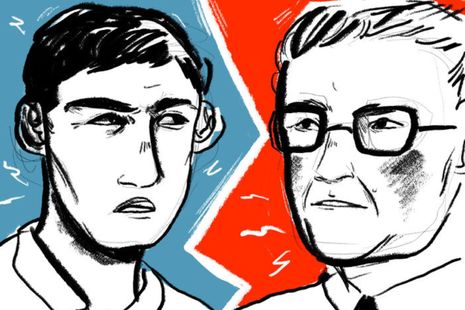The biggest loser of the first general election debate was the British public
Xin Shackleton questions whether the Leaders’ Debate is as democractic as it’s cracked up to be

If remembered at all, the first televised debate of the 2024 general election might go down in history as the most uninspired and pointlessly crafted experience of an already moronic campaign. A total vacuum of anything informing, Starmer proved that he contains all the charisma of a brain in a vat, while Sunak came across as a churlish, pestilent child, interrupting and erring whenever possible. The apex of the debate’s farce saw presenter Julie Etchingham have to interrupt the two men to instruct them to stop interrupting her. By the end, viewers were probably left feeling more indecisive than when they tuned in.
“Giving as much airtime to the Euros as Gaza only cemented the debate’s ineptitude”
Yet, as much as the blame lies with its protagonists, the revised framework and structure of the debate also encouraged empty soundbites and trite platitudes. Breadth over depth was the order of the day, with ITV’s new rule (marshalling answers to 45 seconds) dumbing politics down to its lowest level of comprehension. The issues that have come to define this election – inflation, migration, the cost-of-living crisis – were barely scratched over during their ridiculously short, allotted times. ITV’s ingenious “hands up” segment, likely devised so producers could give themselves a pat on the back for getting “real answers” from politicians, was as bad as it sounds. Meanwhile, giving as much airtime to the Euros as Gaza only cemented the debate’s ineptitude at discerning the immense complexities involved in realpolitik.
The rapidity with which topics were discarded prevented even basic fact-checking. At one point, Sunak implied that Starmer’s potential endorsement of offshore asylum processing was implicit support for his Rwanda proposal. Rwanda, however, functions, not as an offshore processing scheme, but a repository where asylum seekers would be held notwithstanding the outcome of their claims. It doesn’t take a political scientist to see why 62% of viewers reported feeling “frustrated” following the debate.
“The rapidity with which topics were discarded prevented even basic fact-checking”
What is the point of televised debates when their format obstructs them from performing the very function that justifies their existence? Despite their problems, there is a vital democratic element to TV debates. Any healthy democracy requires a clear line of communication between representatives and the represented. The TV debate, when working properly, offers an opportunity to scrutinise political leaders and have them present their case directly to us.
In our age of mass media consumption, they have become ever more important. A 2017 study found that a third of viewers thought that watching the debates helped them decide who to vote for. This was especially true for young viewers. If televised debates are the conduits through which many of us make our political decisions, you would hope they are crafted as democratically as possible.
That naïve hope, however, is only for the politically innocent. It may be surprising to learn that televised debates in the UK have only existed since 2010. Unlike other “democracies” such as the US, which boasts a tradition of televised debates since Kennedy/Nixon, we can only go as far back as Brown/Cameron/Clegg. Clegg’s presence at the first debate is significant since it marked the first – and last – time the Liberal Democrats were invited. His triumphant performance gave his campaign invaluable exposure and attention, dubbed “Cleggmania”, and his newfound success wasn’t lost on Labour or the Conservatives.
“The organisation of debates should be stripped from the hands of politicians entirely”
You see, given the recent incorporation of TV debates in the UK, they have remained relatively ad hoc, escaping regulation by a third-party (like the FCC in America). Instead, they are fabricated by the participating parties in backroom negotiations. Labour and the Conservatives agree on the number of debates, their timing and, most significantly, who can participate. Only then do they find broadcasters to air them.
It’s thus unsurprising that, following 2010, the Leaders’ Debate has omitted the Liberal Democrats. Both the Conservatives and Labour hope to avoid giving free exposure to smaller parties. Hence, the debate is far from impartial. Indeed, it’s the complete opposite, employed as another tool for prolonging the two-party system.
The organisation of debates should be stripped from the hands of politicians entirely. Here, we could take a note from Canada. An independent Leaders’ Debates Commission was established in 2018 to arrange debates for the 2019 federal election. This Commission enforced clear conditions for inclusion in debates and invited submissions from TV channels wishing to broadcast them. It also assembled a roundtable of political experts to prepare the structure of debates. Canada’s example exhibits how, even in a pluralist parliamentary democracy, an independent debates commission could take power away from the major parties and refocus the televised debate back to its crucial role of informing the public.
 News / CUP announces funding scheme for under-represented academics19 December 2025
News / CUP announces funding scheme for under-represented academics19 December 2025 News / SU reluctantly registers controversial women’s soc18 December 2025
News / SU reluctantly registers controversial women’s soc18 December 2025 News / Cambridge welcomes UK rejoining the Erasmus scheme20 December 2025
News / Cambridge welcomes UK rejoining the Erasmus scheme20 December 2025 Features / Should I stay or should I go? Cambridge students and alumni reflect on how their memories stay with them15 December 2025
Features / Should I stay or should I go? Cambridge students and alumni reflect on how their memories stay with them15 December 2025 Film & TV / Timothée Chalamet and the era-fication of film marketing21 December 2025
Film & TV / Timothée Chalamet and the era-fication of film marketing21 December 2025










